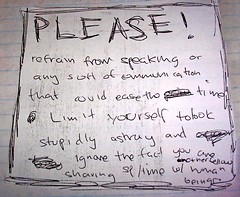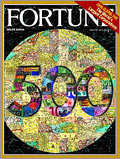 A former US president does not come alone
A former US president does not come alone
bryanpearson via FlickrShould we compensate our speaker and how much? (2)In the previous entry we mainly focused on the market for unpaid speakers, who would at best ask a compensation for their expenses. Many of the speeches, seminars, lectures and contributions in panels are given for free and for a good reason: in most cases there would not be a viable market for professional speakers. Here we are going to focus on those professionals and the reasons to choose them.
First a short note about the so-called celebrity market, as we did also for the unpaid speakers in the previous entry. This is most certainly the market that catches most of the media headlines and the fantasy of potential speakers. Speakers like Bill Clinton can ask huge fees and - although most of it is going in the case of Clinton to his charities - it is still the market most people know. Getting a celebrity status is very much determined by culture, a subject we will cover later on. Of course, Alan Greenspan is also a celebrity in China, but among the foreigners there are only very few who can claim that status also outside their own country, including the related price tag.
Getting those celebrity speakers is certainly possible, but you would have to take a long lead time into account and the additional burden. Even a former US president does not come alone and we would be talking here about a major operation.
But most of the speaking business is much more mundane.
When would it make sense to start thinking about a professional speakers from outside your own network? As we have seen unpaid speakers can have a problem. No-shows is not really a problem with professional speakers. In most cases you would sign a contract with them of a speakers' bureau and you can be pretty sure this speaker will show up. Of course, no contract could stop emergencies, but speakers' bureaus would have larger resources that would allow you to find alternatives on the same level pretty fast. Although, in our experience, we never had a speaker backing out after the signing of the contracts.
So, when you cannot allow yourself a no-show a professional speaker makes sense. But there is more.
Also, when you need a speaker who is going to deliver an agreed message in stead of an easy promotional talk, you would have to think about such a professional speaker. Speakers are standing on the stage with an intention and when you do not want a speaker to solicit assignments on stage, you might have to think about a professional speaker.
When you need a specialist to cover a rather specialized area, you might have to asked specialized speakers. For specialized assignments some of the speakers' bureaus have specialities to cater for specific niche market. You might use need just like you need headhunters when you have special needs for new staff.
Of course, you can do this process internally too and mostly in China this is still done internally. You can assign one of your capable and highly paid manager to get a qualified speaker. But we see that especially the larger companies cannot afford to do this highly qualified search internally, because your good people tend to be rather busy anyway and this is not the job you want to leave to somebody who has actually nothing better to do.
Of course, the need for a professional speaker has to be there: your board is visiting, crucial customers get together, your organization is in the middle of a change process, there are many occasions when a professional speaker is a great help. Often, in larger conferences, the professional speakers are just a part of the action. They would deliver a crucial key note speech, while other speakers would come through other resources and do their work often for free. It is a delicate decision making process and just like in any other urgency, you have to make a timely decision on when to get professional help for your challenge.
Now, what kind of prices are we talking about? Let's first focus again on the top-end of the market. Mostly the figures celebrities make are proprietary information, but in some cases we can use public sources to get an idea. Bill Clinton made, according to the information Hillary Clinton had to file when she decided to run for the US presidency,
an average of US$200,000 per standard speech. For speeches in the US that would be up to US$150,000, but when he goes abroad, you can easily add another US$100,000 or more. Clinton would belong to the top-league, but he is certainly not alone at the top.
That mechanism works for most speakers: when you fly them in from another continent, prices would typically at least double.
The event organizers would also have to carry the costs that would come additionally, at least a return business class and a decent hotel and the "Blue M&M's" as one of the US firms called that, for the time of his or her stay. That could add considerably to the expenses, also because some of the top-end celebrities would demand (and get) a private plane. By working through a speakers' bureau you could try to reduce that kind of extra expenses through bundling different speaking opportunities, although as a rule the speakers' fee is non-negotiable.
Most of you will not invite the Clinton's for you party, but some of the game rules remain the same. Those fees would easily double for trips abroad and business class flight is considered to be the minimum. It is always the speaker who sets the fee and a speakers' bureau would get a percentage of that fee. Clients do not have to pay additional for the work of the speakers' bureau. That means that you cannot negotiate about the speakers' fee with a speakers' bureau. What a speakers' bureau can do if a speaker is too expensive for your budget is suggest alternatives, but the more expensive speakers ask mostly their fees for a good reason. Even quality speakers, you can have on different levels.
What is your cut-off rate, was one of our standard questions in the many talks we had with other speakers' bureaus before we took off in China. When are you no longer interested in dealing with clients or speakers? Nobody wanted to do deals below US$3,00o for a standard speech and we have taken over that benchmark. Most of our speakers are well above that level.
Are you shocked by those prices? You would not be the first one, but then you have to ask yourself whether you are looking for a professional speaker or not. As we have seen in the previous entry, when you play your cards right, you can even get speakers paying you. But we would not guarantee their quality.
In short, you need a professional speaker when they are crucial for your operation. You also do not hire McKinsey to clean your windows, do you?
Previous entries:1.
Introduction2. When to look for an outside speaker?3. Who is in the audience?4.
How does the organization of your event looks like?
5.
What is your target?6.
Should we compensate our speaker and how much? (1)7.
Should we compensate our speaker and how much? (2)






























